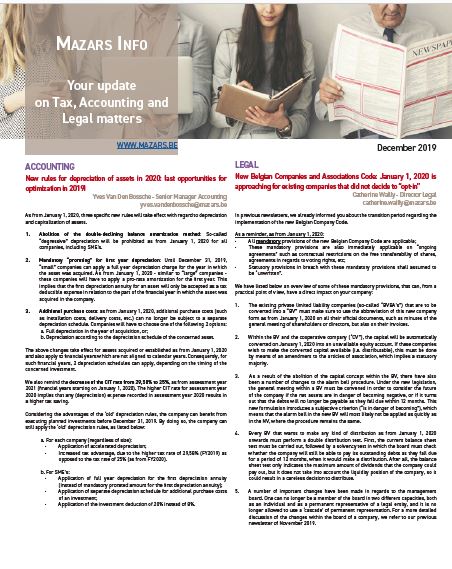
Mazars Info December 2019
ACCOUNTING
New rules for depreciation of assets in 2020: last opportunities for optimization in 2019!
As from January 1, 2020, three specific new rules will take effect with regard to depreciation and capitalization of assets.
- Abolition of the double-declining balance amortization method: So-called "degressive" depreciation will be prohibited as from January 1, 2020 for all companies, including SME’s.
- Mandatory "prorating" for first year depreciation: Until December 31, 2019, "small" companies can apply a full year depreciation charge for the year in which the asset was acquired. As from January 1, 2020 - similar to "large" companies - these companies will have to apply a pro-rata amortization for the first year. This implies that the first depreciation annuity for an asset will only be accepted as a tax deductible expense in relation to the part of the financial year in which the asset was acquired in the company.
- Additional purchase costs: as from January 1, 2020, additional purchase costs (such as installation costs, delivery costs, etc.) can no longer be subject to a separate depreciation schedule. Companies will have to choose one of the following 2 options:
a. Full depreciation in the year of acquisition, or;
b. Depreciation according to the depreciation schedule of the concerned asset.
The above changes take effect for assets acquired or established as from January 1, 2020 and also apply to financial years which are not aligned to calendar years. Consequently, for such financial years, 2 depreciation schedules can apply, depending on the timing of the concerned investment.
We also remind the decrease of the CIT rate from 29,58% to 25%, as from assessment year 2021 (financial years starting on January 1, 2020). The higher CIT rate for assessment year 2020 implies that any (depreciation) expense recorded in assessment year 2020 results in a higher tax saving.
Considering the advantages of the ‘old’ depreciation rules, the company can benefit from executing planned investments before December 31, 2019. By doing so, the company can still apply the ‘old’ depreciation rules, as listed below:
a. For each company (regardless of size):
- Application of accelerated depreciation;
- Increased tax advantage, due to the higher tax rate of 29,58% (FY2019) as opposed to the tax rate of 25% (as from FY2020).
b. For SME’s:
- Application of full year depreciation for the first depreciation annuity (instead of mandatory prorated amount for the first depreciation annuity);
- Application of separate depreciation schedule for additional purchase costs of an investment;
- Application of the investment deduction of 20% instead of 8%.
LEGAL
New Belgian Companies and Associations Code: January 1, 2020 is approaching for existing companies that did not decide to "opt-in"
In previous newsletters, we already informed you about the transition period regarding the implementation of the new Belgian Company Code.
As a reminder, as from January 1, 2020:
- All mandatory provisions of the new Belgian Company Code are applicable;
- These mandatory provisions are also immediately applicable on "ongoing agreements" such as contractual restrictions on the free transferability of shares, agreements in regards to voting rights, etc;
- Statutory provisions in breach with these mandatory provisions shall assumed to be "unwritten".
We have listed below an overview of some of these mandatory provisions, that can, from a practical point of view, have a direct impact on your company:
- The existing private limited liability companies (so-called "BVBA’s") that are to be converted into a "BV" must make sure to use the abbreviation of this new company form as from January 1, 2020 on all their official documents, such as minutes of the general meeting of shareholders or directors, but also on their invoices.
- Within the BV and the cooperative company ("CV"), the capital will be automatically converted on January 1, 2020 into an unavailable equity account. If these companies wish to make the converted capital available (i.e. distributable), this must be done by means of an amendment to the articles of association, which implies a statutory majority.
- As a result of the abolition of the capital concept within the BV, there have also been a number of changes to the alarm bell procedure. Under the new legislation, the general meeting within a BV must be convened in order to consider the future of the company if the net assets are in danger of becoming negative, or if it turns out that the debts will no longer be payable as they fall due within 12 months. This new formulation introduces a subjective criterion ("is in danger of becoming"), which means that the alarm bell in the new BV will most likely not be applied as quickly as in the NV, where the procedure remains the same.
- Every BV that wants to make any kind of distribution as from January 1, 2020 onwards must perform a double distribution test. First, the current balance sheet test must be carried out, followed by a solvency test in which the board must check whether the company will still be able to pay its outstanding debts as they fall due for a period of 12 months, when it would make a distribution. After all, the balance sheet test only indicates the maximum amount of dividends that the company could pay out, but it does not take into account the liquidity position of the company, so it could result in a careless decision to distribute.
- A number of important changes have been made in regards to the management board. One can no longer be a member of the board in two different capacities, both as an individual and as a permanent representative of a legal entity, and it is no longer allowed to use a ‘cascade’ of permanent representation. For a more detailed discussion of the changes within the board of a company, we refer to our previous newsletter of November 2019.
CORPORATE TAX
Year-end is approaching, don’t forget your tax optimization!
Further to the 2018 CIT reform, a lot of new tax rules have already been introduced in FY18 and FY19. However, in a last phase, some important changes will apply as from January 1, 2020. In this respect, it could be beneficial to verify which optimizations are still possible before year-end.
Decrease of nominal corporate income tax rate as from January 1, 2020
As from 2020, the nominal Belgian CIT will be further reduced from 29,58% to 25% in 2020. The existing 20% rate on the first € 100.000 taxable profit remains applicable for small and medium sized companies ("SME’s").
Anticipating this CIT rate drop, one could consider to anticipate costs in 2019 and defer profit to 2020.
20% investment deduction until December 31, 2019
Since the latest CIT reform, SME’s can apply a one-off investment deduction of 20% on qualifying investments made between January 1, 2018 and December 31, 2019. As from January 1, 2020, a lower 8% will be applicable.
The following investments are eligible for the application of the investment deduction:
- Investments in tangible and intangible assets depreciable over minimum 3 years;
- Which are acquired or established in new condition during the taxable period;
- If these assets are used in Belgium for the professional activity.
Bear in mind that the investment deduction cannot be cumulated with the application of the notional interest deduction. However, given the decreased NID rate and the recently limited calculation basis, the investment deduction mostly offers a higher tax advantage.
Quarter 4 advance tax payment
If your financial year is ending on December 31, 2019, it may be worthwhile to take into account the last due date for making an advance tax payment (i.e. December 20, 2019) in order to avoid (or minimize) a 6,75% surcharge in case no or insufficient advance tax payments are made. If your company does not dispose of the necessary cash to perform this voluntary Q4 advance tax payment, it might be beneficial to obtain a bank loan comparing the low market interest rates to the potential 6,75% surcharge.
Tax consolidation
As from January 1, 2019, certain affiliated companies in Belgium may apply a limited form of tax consolidation. The Belgian tax consolidation regime is also known as the ‘group contribution regime’, allowing compensation of profits and losses between affiliated qualifying tax payers.
If this specific regime would be applicable to your group of companies, please consider the impact on your end-year tax provision and Q4 advance tax payment as well as the required accounting entries, payments and the signing of the "group contribution agreement".
VAT
VAT administration will increase its controls on the correct and timely reporting of VAT
The Belgian Tax Authorities have communicated that they will increase their controls on the correct application of the chargeability of VAT on the transactions reported in the Belgian VAT return. This communication has been done as a result of the issuance of an administrative circular letter on July 9, 2019 explaining (repeating) the different treatments of chargeability of VAT on all sort of transactions.
The chargeability of VAT is the moment when the VAT has to be declared (paid) in the Belgian VAT return. If a business is not applying the correct rules, the administration might impose late-payment interests, i.e. 0,8% for each month the VAT has been reported too late.
For that reason we want to repeat the most important rules of chargeability of VAT in Belgium between VAT payers (so not B2C and B2G).
VAT is due:
- For a local supply of goods and rendered services in Belgium: time of supply of the good or rendering of the service
o exception: date of the invoice when issued (regardless whether this invoice is issued before or after the time of
supply of the good/service);
o at the moment of receiving a payment (partial or in full);
o no later than the 15th of the month following the supply/the service, if the invoice is not issued in time.
- For an intracommunity supply of goods: the VAT becomes chargeable at the moment the invoice is issued for the full supplied amount.
- For an intracommunity supply of services: same rules as for local supplies of goods and services;
- For import: at the moment of custom clearance.
New Dutch VAT-numbers for self-employed businesses
Dutch VAT numbers of self-employed businesses are currently linked to the social security number of the director of the business. For GDPR reasons, the Dutch government decided to issue new VAT-numbers to those businesses. As of January 1, 2020, those businesses will receive a new VAT number. It can therefore be important to check that your business is using the correct, new Dutch VAT number of your client with regard to your accounting and VAT formalities (such as the EC-listing).
LABOUR LAW
The non-recurring bonus as an alternative to the cash bonus
What is the non-recurring bonus?
The non-recurring bonus or the CLA 90 premium is a bonus which an employer can give to his employees when achieving a certain predetermined collective objective. The collective character refers to the objectives to be achieved as well as to the persons who can enjoy this type of bonus.
The objective(s) to be achieved must be a collective goal and thus cannot be linked to individual goals of the employees. This goal (or goals) has (have) to be clear, transparent, measurable and verifiable. This concerns for example: the achievement of a certain turnover or reducing the number of accidents at work or the number or sick days in the company, achieving a certain number of approved orders, reducing the amount of claims by the client, etc.
The goals are set for a certain period, the reference period, which can go from 3 months up to (longer than) 1 calendar year.
The bonus must be granted to all employees of the company, a group of companies or a well-defined group of employees. The company can decide to implement different goals per (well-defined) group of employees.
The procedure
For employees for whom there is a trade union delegation, the wage bonus must be introduced by means of a collective agreement. For employees for whom there is no trade union delegation, the wage bonus can be introduced by means of a collective agreement, but also by means of an act of accession.
The bonus plan must be submitted for registration to the FPS Labour. They will check the form, as check if the conditions (collective, measurable, etc.) are met. This can take up to 2 or 3 months’ time. The plan has to be submitted before the end of one third of the reference period for achieving the objective(s). Please note, that in order to start a bonus plan at the beginning of 2020, we recommend to start drafting the bonus plan as soon as possible!
The advantages of the bonus
The non-recurring bonus is not subject to wage withholding tax, is tax-deductible as a business expense and does not qualify, for example, for the calculation of the severance pay and the holiday allowance. In order to be exempted from taxes, the bonus can go up to an amount of 2.941 EUR (amount 2019) per calendar year and per employee.
With regard to the NSSO, the maximum amount of the bonus is 3.383 EUR per calendar year and per employee. Up to this amount, the bonus is excluded from the wage concept and therefore no normal social security contributions are due. However, the bonus is subject to a special employer’s contribution of 33% and a solidarity contribution of 13,07% on the part of the employee.
In this respect, the specialists of our legal team can assist you in drafting a bonus plan or providing you with more information on this subject.
KEEP IN MIND !
VAT
- VAT return November 20, 2019: before December 20, 2019
- VAT December advance payments: December 24, 2019
PERSONAL INCOME TAX RETURN
- Personal income tax return – Belgian non-residents
o Via proxyholder: December 23, 2019 (postponed)
CORPORATE INCOME TAX RETURN
- Advance tax payments: December 20, 2019
- FY19 CBC-Notification - due December 31, 2019: only required if the FY19 information deviates from the FY18 reported data
- FY18 Master File - due December 31, 2019
LEGAL
- UBO-registration: Regulated tolerance until December 31,2019 – no sanctions for late registration


